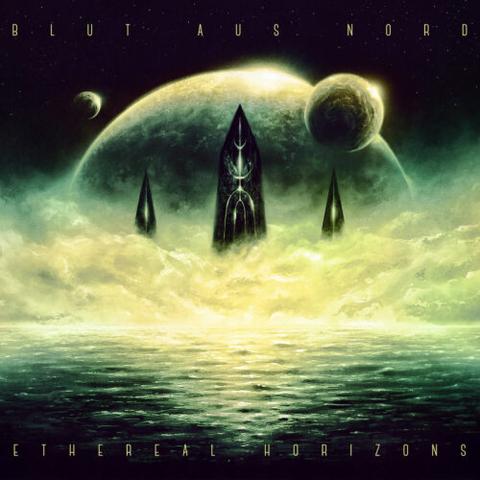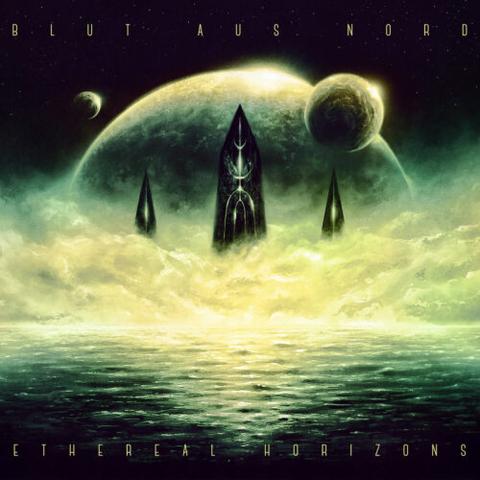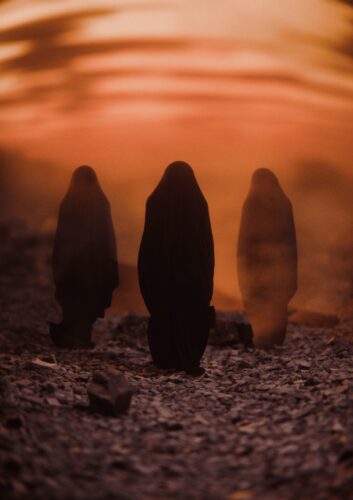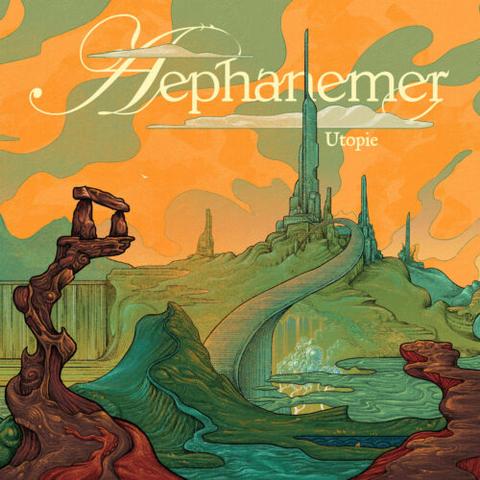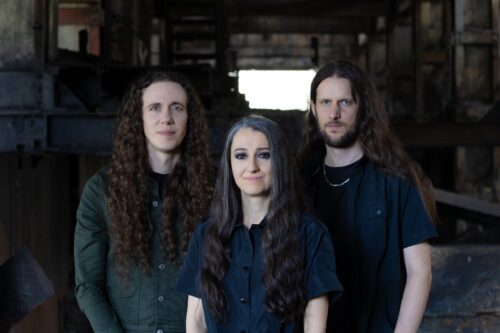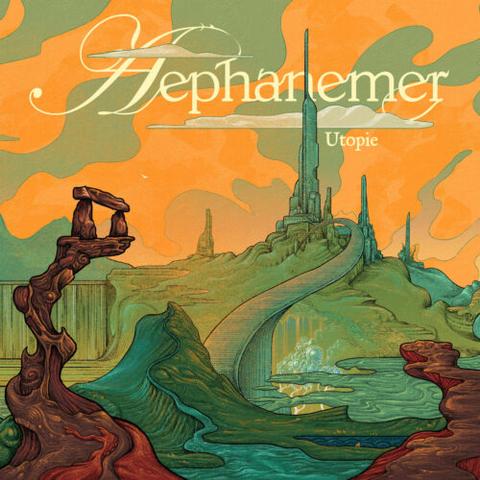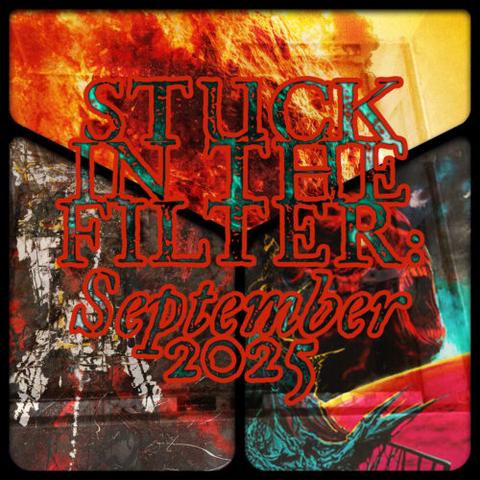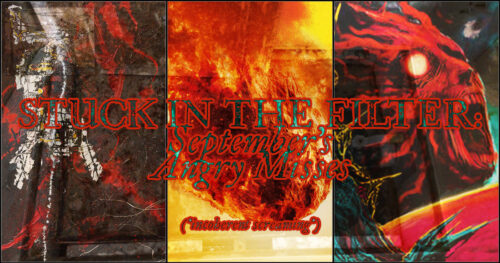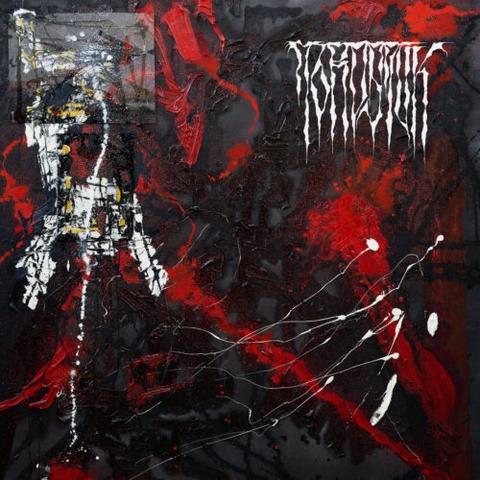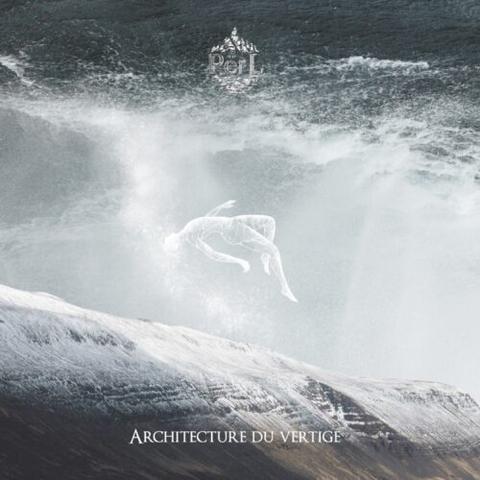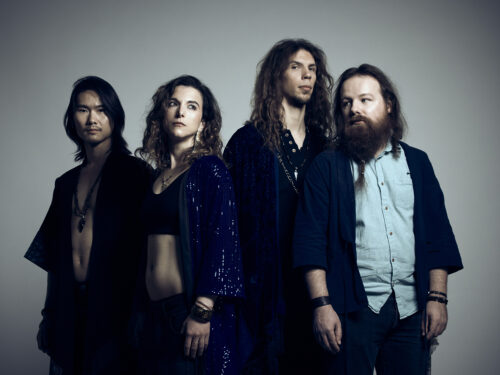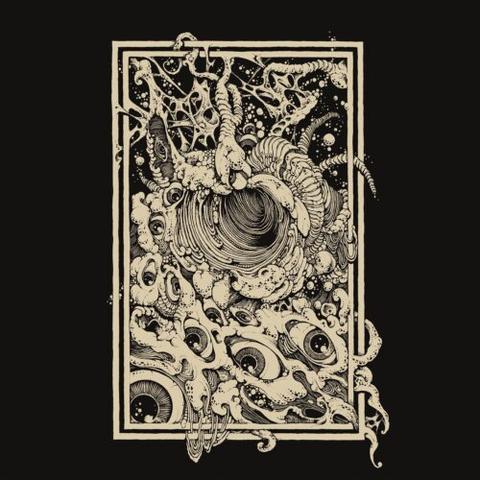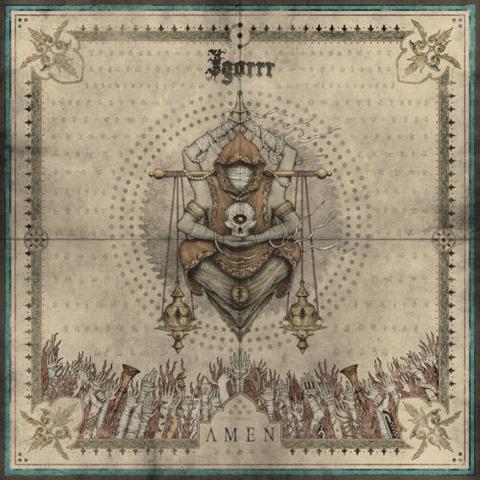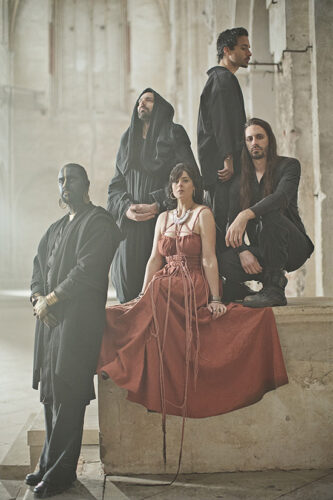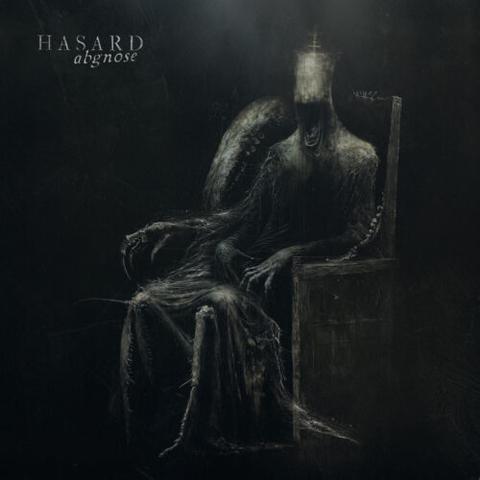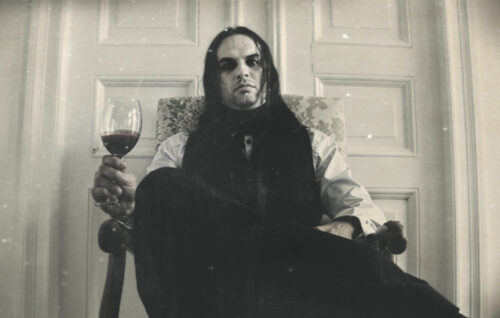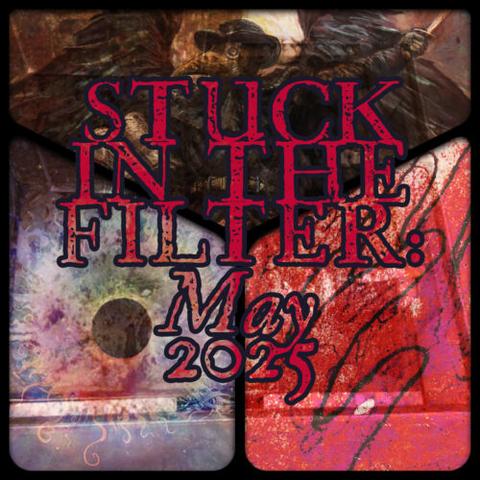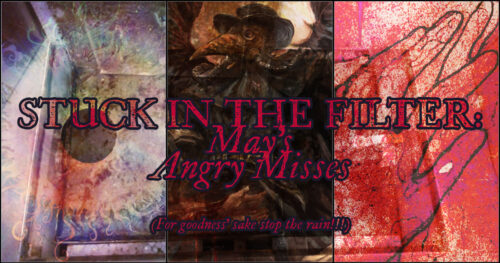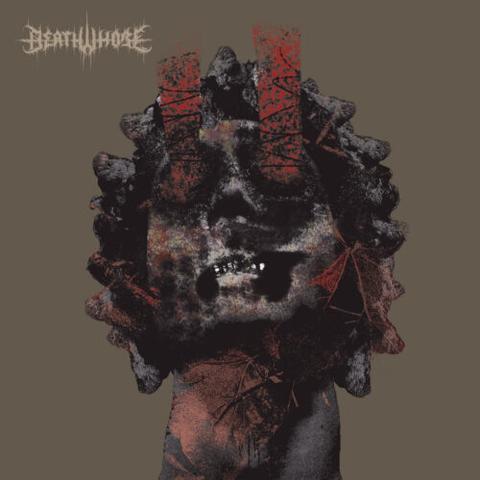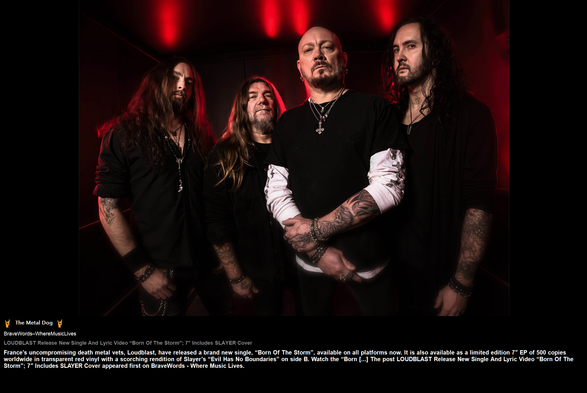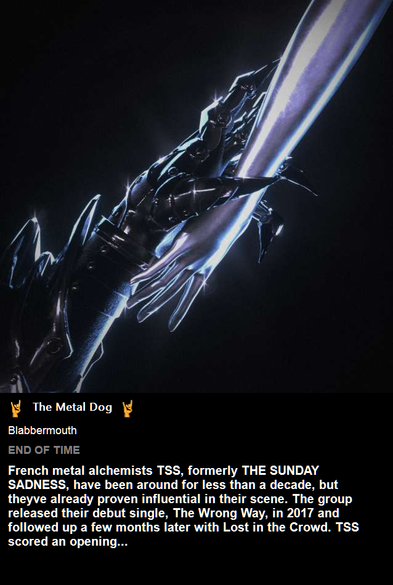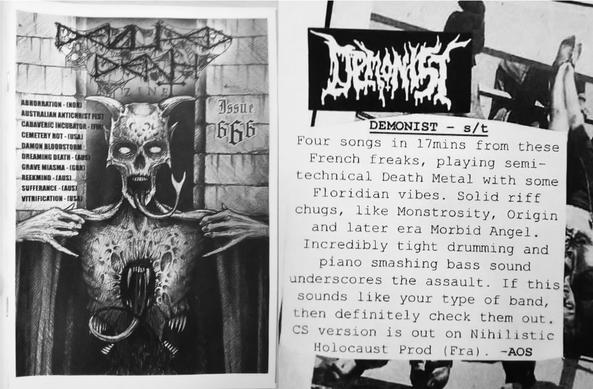Stuck in the Filter: May 2025’s Angry Misses
By Kenstrosity
Every day we toil, rain or shine, to find you the semi-finest ore of the month. Lately, though, it’s been mostly rain. Leaks abound, uniforms are soaked to the bone, the chutes are slick and slippery. We must continue, however, to provide for the masses!
Unfortunately, we don’t have any resources to keep anything dry in this godforsaken place. I hope you like your Filter nuggets soggy!
Kenstrosity’s Meanest Meanies
Death Whore // Blood Washes Everything Away [May 16th, 2025 – Self-Release]
Hailing from Nancy, France, crust/death newcomers Death Whore unleashed what is surely one of the meanest records of the year so far. A debut capable of humbling some of the better releases by far more seasoned acts, Blood Washes Everything Away is a nonstop cavalcade of stank-face, bone-shattering riffs. From the onset of vicious onslaught “Inhaling the Dead,” to the stomp and swerve that is the massive “Infernal Terror Machine” and “None Are Forgotten,” to the blistering and evil “12 Worm Wounds,” Death Whore crafted 11 brutally addictive, but smart and lean cuts guaranteed to snap necks. They allow only the sharpest hooks to imbue accessibility to this killer material, but make no sacrifice to the filthy, crust-laden tones and textures determined to pummel and paste (“Noyé dans le sang,” “Motorthroat ’79,” “Savage Aesthetic Revenge”). Throw in a refreshing message criticizing late-stage capitalistic trends, worldwide misappropriation of wealth by the elite class, and the futility of hard work in the modern era for those struggling to meet their basic needs (“You Owe Me a Living”), and you’ve got a record after my heart. I can already tell that I’m going to regret not saving Blood Washes Everything Away from Filter relegation by the time this publishes, but don’t let my transgression in this matter stop you from enjoying of deep Death Whore.
Executionist // Sacrament of the Sick [May 16th, 2025 – Self-Release]
West Virginian death thrashers Executionist were not on my radar. First off, I am, historically, very picky when it comes to thrash. It slaps when it slaps and leaves me cold when it doesn’t. Lately, though, I’ve been digging the style more and more, and Executionist’s particularly meaty take on Kreator WIOLENCE has my attention thoroughly affixed. With debut LP Sacrament of the Sick, Executionist bring on the riffs, but elevate them with blackened tremolos, rabid barks, and an immense bass tone. Opener proper “Edge of Annihilation” pulls no punches, but only hints at the quality held beyond. There’s an almost At the Gates-like sense of melody here, one which works in tandem with deadly riffs and blackened char instead of as a mere surface-level decoration (“Wheels of War,” “Divided We Stand… United We Fall”). While Sacrament of the Sick relies heavily on the long form for its song structures, creating a spot of bloat, there’s usually something memorable and interesting to keep me invested in the story from beginning to end (“Thy Kingdom Come,” “Sacrament of the Sick”). With just a little tightening of the screws, Executionist could easily become the next big name in thrash. Until then, rest easy knowing Sacrament of the Sick is a worthy contender on its own merits.
Thus Spoke’s Shiny Scraps
Ghost Bath // Rose Thorn Necklace [May 9th, 2025 – Nuclear Blast]
DSBM is a genre of necessity tied to a particular mood, and it’s not a happy one. In spite—or perhaps because—of this,1 it’s one I usually enjoy. Ghost Bath’s take on this particular type of misery music has fluctuated between more black metal and more post, and I personally found it never quite stuck. Rose Thorn Necklace, however, has kept me coming back for repeated mope sessions for weeks. It’s still recognisably Ghost Bath thanks to those same echoing howls that lurch into voiceless high-pitched wails (“Well, I Tried Drowning”), and a familiarity about the bitter refrains. But synths now play a prominent role in driving melody2 both dreamy (“Grotesque Display,” “Throat Cancer”) and uncomfortably upbeat (“Vodka Butterfly”), as things swing back in the direction of post-leaning DSBM. Layered strums lace into pessimistic chord swings and scream-resonant atmoblack (title, track, “Dandelion Tea,” “Stamen and Pistil”), sometimes recalling Harakiri for the Sky. It manages to be pretty, in that characteristically depressing way, as minor melodies bleed into blackened tantrums (“Well, I Tried Drowning”) or ride on synths as harrowing screams narrate (“Throat Cancer”). The snippets of coughing (“Dandelion Tea”), sobbing (“Vodka Butterfly”), and sirens (“Throat Cancer”) are par for the course, but still very effective, and the ending duo “Needles” and the horribly—but brilliantly—named “Throat Cancer” is kind of…genuinely lovely in a really gross, demoralising sense. I’m converted.
ClarkKent’s Bestial Beats
Animalize // Verminateur [May 23, 2025 – Dying Victims Productions]
While the album cover might not inspire confidence, make no mistake, Animalize is worthy of your attention. On their sophomore album, Verminateur, these Frenchmen bring youth and energy to the old school speed and traditional metal scene. They mix up mid-tempo tunes with high-octane thrash, and even throw in a lovely piano ballad for good measure (“Priere de Remords”). On tracks like “Chevel Astral” and “Au Jugement de Soi” you can hear influences ranging from Accept to Def Leppard, while the lightning-fast “Verminateur” sounds like a blast from Judas Priest’s Painkiller. Front man Coyote brings plenty of charm, ranging from excitedly shrill to cool-headed, all while executing some well-timed “oohs” and infectious laughter here and there. Fortunately, he doesn’t carry all of the weight. Jessman and RattleGab keep the riffs spicy throughout, ensuring Animalize never phones it in, while Lynx’s drumming adds some much-needed heft. The songwriting is nice and tight, allowing the album to clock in at a tidy 36 minutes. As good as each song is, the icing on the cake is “Envahisseurs,” which will end up as a strong candidate for song of the year. It brings a killer riff and thrilling energy that’s sure to get the Statue of Liberty to drop her torch and make some devil horns.
Owlswald’s Feathered Echoes
Pandemia // Darkened Devotion [May 16th, 2025 – Hammerheart Records]
After a decade between releases, Czech death metal veterans Pandemia burst back onto the scene with their sixth full-length, Darkened Devotion. Still channeling the menacing souls of legends like Vader and Immolation, Darkened Devotion marks a significant yet successful pivot towards a more accessible sound for Pandemia. Delivering bone-crushingly heavy and succinct songs that are both memorable and easily palatable, Pandemia haven’t lost their edge—they’ve simply refined it. From “Nightmare Paradox’s” gut-punching, wicked riffing to “Catalepsy’s” gratifying, atmospheric thrash-inspired arpeggiations, every part of Darkened Devotion feels focused and tastefully executed. New drummer Jake Bayer (Cutterred Flesh) is an absolute beast, shaping Darkened Devotion’s mammoth backbone with thunderous rapid-fire double bass runs (“Blessed, Blessed Oblivion,” “Depths”), intricate tom fills (“The Pallor of Detest,” “The Wretched Dance”) and precision blasts (“Nighttime Paradox,” “A Sea to Breathe In”). Returning guitarist Alex Marek—last heard on 2005’s Riven—unleashes a barrage of infectious shredding that makes headbanging involuntary. Jaroslav “Jarda” Friedrich’s bass and Jikra Krš’s vocals complement Bayer and Marek’s authority with angry drawls and guttural, gravely growls. The album’s overall tone is immense, effortlessly engulfing listeners into its nocturnal anxieties with ease. With Darkened Devotion, Pandemia have forged a refined and brutal auditory feast that genuinely took me by surprise. Embrace the darkness.
Killjoy’s Dreamy Delights
Asthénie // Iridescence [May 5th, 2025 – Self-Release]
Iridescence is literally a colorful piece of music. Named after the naturally occurring phenomenon of an object appearing to change colors, Asthénie assigned a different color to each of these five songs. The guitars are the main focus here—whether with a glimmer (“Mélèze”) or a shimmer (“Indigo”), they brilliantly showcase the prettier side of post metal. Hardcore-tinged screams boldly accentuate the guitars’ vibrant hues, providing heft and urgency. Somewhat ironically, “Gris” (meaning grey) takes up the most time at 11 minutes and is the most developed contrast between the calm and furious. At only 35 minutes in total, Iridescence passes like a beautiful breeze with little fluff or filler. While by no means necessary, some clean vocals could potentially add even more color to a future release. Though this is not the first instance this year of a post-black record patterned after various wavelengths in the visible light spectrum, Iridescence is resplendent in its own right.
Au Clair de Lune // In the Wake of Dusk [May 16th, 2025 – Self-Release]
Moonlight and bodies of water share an intrinsic artistic bond. There’s something deeply enchanting about a celestial, ghostly source of illumination amidst a dark, murky setting. Leonard Sinaguglia’s blackgaze project Au Clair de Lune aurally combines these two aesthetics via dreamy, floaty guitars and synths akin to Autumn Nostalgie and, of course, Alcest’s Écailles de Lune. At times, the melodies are smooth and glassy like the surface of a lake (“Echoing Silhouettes,” “Neon Dusk”). Other times, they’re upbeat and catchy as a rip current (“Anaemoia,” “Distant Glow”). The principal vocal style is a mild rasp, more for flavor than heaviness, though Falyriae adds her airy singing voice on occasion. Although the track order and overall pacing usually find a good balance between the atmospheric parts and the punchy parts, the longer track lengths make In the Wake of Dusk feel a bit fluffy in places. But even so, Au Clair de Lune provides a satisfying and transportative experience to an unearthly realm.
Dolphin Whisperer’s Dusky Deposition
Slumbering Sun // Starmony [May 9th, 2025 – Self Release]
Music is the closest thing we have to magic in this world. When a great song or a great album graces your ears, it’s a clean sweep to any combo the head, heart, and gyrating body. Such was the case with Lone Star Doomsters Slumbering Sun and their debut release The Ever-Living Fire back in 2023. With a fragile heart in one hand and a fat riff in the other, their take on the kind of sadboi doom you’d hear in bands like Warning or early Pallbearer struck me deep. On Starmony, much of the same elements return: growling bass underpinning stadium-sized riffs, Ozzy-like vocals that bustle with a modern emotion and charisma, and a posty playfulness that allows long-form compositions to swell and soar. The only trouble is that it takes a couple songs for Starmony to settle into that same form of riffed-out hypnosis, with the one-two intro of “Together Forever” and “Keep It a Secret” sounding like the middle drive of a live set rather than the start of an introspective journey. But with the violin-assisted weeping catharsis of “Midsommar Night’s Dream” and “Wanderlust,” the waltzing melody of “Danse Macabre,” and the Thin Lizzy-styled dueling leads of “The Tower,” Slumbering Sun again finds a monstrous groove in hopeful and hammering songcraft. And, of course, if you get a chance to catch this act live like I did, just a few days before The Dolphlet emerged, you’ll fall extra prey to the kinds of doomy incantations that Slumbering Sun conjures with their mystic-minded compositions. In fat riffs we trust, and in sorrowful hearts we linger.
Tyme’s Tragic Tones
Enterré Vivant // 悪罪 (Akuzaï) [May 26th, 2025 – Antiq]
Comprised of French multi-instrumentalist Erroiak and vocalist Sakrifiss—whose 25-year residency in Japan heavily influences the music—depressive black metallers Enterré Vivant’s3 third album, Akuzaï, blew me away. My DSBM bar was set long ago by Shining‘s unfuckwithable V: Halmstad, and yet Akuzaï has come along to give it a run for its money. Centered around 10 Buddhist sins, Akuzaï relates the experiences of Japanese civilians and victims during the Second World War. From the emotionally charged cover photo depicting a mother breastfeeding her newborn shortly after the bombing of Nagasaki,4 to the haunting interludes and shimmering, melancholic melodies within, Akuzaï melds traditional, tremolo-picked guitars and icy vocals ala Summoning and Emperor (“Sesshô,” “Shin’i”) with Moonsorrow-esque keys, Japanese-influenced flutes and violins, along with ghostly moaning howls to create its depressive atmospheres. Transitioning from the twisted croaks of interlude “Waraguchi,” album highlight “Jain” begins with mournful pianos and a pensive, tremolo-picked lead before crashing forth in waves of crushingly cascading chords and Sakrifiss’ tortured screams, its eight and a half minutes awash in black metal sadness. By the time the wails of a suffering child floated in around the seven-and-a-half-minute mark, my arms had broken out in goosebumps, and my heart was fucking broken. Offering yet another lens through which to view the torturous horrors of war, Akuzaï is harrowing, relentless, and not to be missed.
#2025 #Accept #Alcest #AmericanMetal #Animalize #Asthénie #AtTheGates #AtmosphericBlackMetal #AuClaireDeLune #AutumnNostalgie #Blackgaze #BloodWashesEverythingAway #Crust #CutterredFlesh #CzechMetal #DarkenedDevotion #DeathMetal #DeathWhore #DefLeppard #DoomMetal #DSBM #DyingVictimsProductions #Emperor #EnterréVivant #Executionist #Falyriae #FrenchMetal #GhostBath #HammerheartRecords #HarakiriForTheSky #Hardcore #HeavyMetal #Immolation #InTheWakeOfDusk #Iridescence #ItalianMetal #JudasPriest #Kreator #May25 #MelodicBlackMetal #MelodicDeathMetal #Moonsorrow #NuclearBlast #Pallbearer #Pandemia #PostBlackMetal #PostMetal #Review #Reviews #RoseThornNecklace #SacramentOfTheSick #SelfRelease #Shining #SlumberingSun #Starmony #StuckInTheFilter #StuckInTheFilter2025 #Summoning #ThinLizzy #ThrashMetal #Vader #Verminateur #Warning #悪罪Akuzaï_
